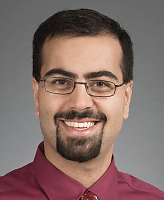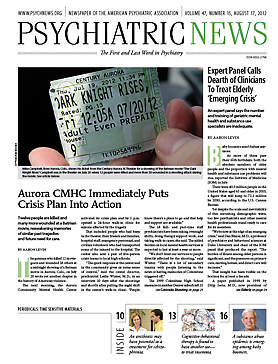You’ll see many articles in this paper on changes in psychiatry—a new DSM, new treatments, and new laws and regulations. There is a bigger change happening too, a change in how we train psychiatrists and what it will mean to be a psychiatrist during our professional lifetimes.
As the member-in-training trustee on the APA Board, I serve as a liaison to the psychiatry residency directors’ association, and I also happen to serve on the Accreditation Council for Graduate Medical Education (ACGME) Residency Review Committee for psychiatry, giving me an advance view of what’s on the horizon.
The role of doctors overall is shifting, and psychiatry is along for the ride. As health systems rely more on allied health professionals (physician assistants, nurse practitioners, and social workers, for example) to deliver routine care, it’s no longer enough for a physician to be a skilled clinician.
The expectation is that we will come out of residency prepared to be managers and leaders, trained to direct and coordinate an integrated mental health team. Many of us experience this on inpatient rotations, where we learn to coordinate the actions of nurses, therapists, social workers, and others. Tomorrow’s psychiatrists will do that across care settings, and our program directors are trying to figure out how to prepare us for that role.
Within the ACGME, two big projects will support that change. First, starting in 2014, every resident in every specialty will be evaluated against standardized “Milestones”—a set of specific knowledge domains, skills, and behaviors that describe that specialty’s expected development trajectory. The psychiatric curriculum won’t change much, but that early and frequent feedback will help residents see their skills (and needs) in a new way, and it will help programs train their residents more efficiently. It will also produce a generation of physicians who are much more prepared for the continual monitoring and evaluation that the Maintenance of [Board] Certification process requires.
Second, a set of ACGME initiatives focuses on improving skills in “systemsbased practice”—that is, working in a large medical-financial-legal network, allocating resources, and advocating for patients.
These initiatives are driven in large part by resident leaders within the ACGME, based on that vision of physicians as team leaders. Even more initiatives will come as the data accumulate; when the ACGME is receiving individual reports every six months on every resident in the country, and the American Board of Psychiatry and Neurology is getting something similar through its Maintenance of Certification process, we will have unprecedented tracking of psychiatrists across their careers.
Can we as a profession and as individuals use that information to become better clinicians and leaders? Might it be misused by payors or credentialing bodies? Could education researchers find trends that predict patient outcomes?
Furthermore, all of that is happening as the bedrock of residency training, the federal graduate medical education funding that pays our salaries, is under threat. Tracking outcomes through the Milestones will help our institutions make the case for continued funding. Still, if the cuts happen, we may need to rethink psychiatric residency itself. If we can track residents’ competency, does everyone need to spend four years in training? For that matter, since the PGY-4 year is mainly electives, should we have it at all? There is no formal proposal on the table, but it has been studied and argued, and it might be again.
These aren’t easy questions, and all this change will produce unintended consequences.
The one constant is that APA will be there throughout all of it. We have representatives on every committee that’s influencing this work, and through writings such as this column, we report back to the community. We take the input you give us and weave it together to develop residency training in the direction our professional needs. (A large part of that is trying to minimize burdens; trainees and attendings alike have been very clear that there is just too much paperwork and bureaucracy in our lives.) As the changes are implemented, we’ll build resources to help residents prepare and manage them, just as we’ve done in creating online modules that will help psychiatrists maintain Board certification.
APA is here for you during your training, but it will also be there for you after, and will continue to be the forum where trainees and trainers can come together to find new solutions.

Alik Widge, M.D., Ph.D., is APA’s member-intraining trustee and is a PGY-4 resident at the University of Washington.

